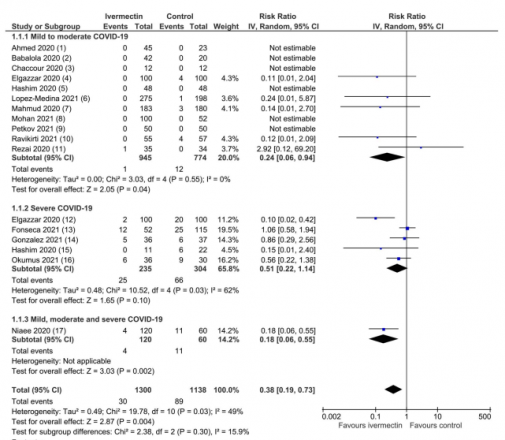Advertisment
Key findings from the ivermectin meta-analysis

June 2021 saw the publication of the systematic review and meta-analysis of randomised controlled trials of ivermectin for treatment and prophylaxis of covid-19 undertaken by Dr Tess Lawrie’s team at the Evidence-based Medicine Consultancy. IMI interviewed first author Mr Andrew Bryant and Dr Edmund Fordham, one of the co-authors to discuss the details of the analysis and its implications.
Mr Bryant, who was responsible for the design of the systematic review, the analyses and their interpretation, described the key findings.
The results of 15 randomised controlled trials of treatment of covid -19 with ivermectin are shown in the forest plot below:

RCTs of treatment of covid-19 with ivermectin
Mr Bryant explains, “Each study is represented by a horizontal line and a square dot. The square dot is the effect size – in this case the risk of dying with ivermectin compared with the risk dying with ‘no ivermectin’ – and the line is the 95% confidence interval. So we know the true effect size is likely to lie on this line.
“Basically if the lines are on the left it means ivermectin is better than control and on the right means the control treatment was better. If the line crosses the vertical line in the middle – sometimes referred to as ‘the line of no difference’ – then you can’t say anything with high certainly …….”
The process of meta-analysis is a way of combining all the results of the individual trials to mimic a large trial to get the overall result or pooled estimate. Larger trials are given more weight in the analysis. The pooled estimate is depicted by the diamond-shaped symbol at the bottom of the plot.
“As you can see it is clearly to the left of the vertical line. This tells us with reasonably high certainty that ivermectin reduces the risk of dying from covid-19…… It shows a clear result – a 62% reduction in mortality”, explains Mr Bryant. The confidence interval is 27 – 81%. In absolute terms, this corresponds to a risk of death of 7.8% in the controls (with no ivermectin) that reduces to 2.3% with ivermectin. “Alternatively, we could say that in average there were 48 fewer deaths per 1000 people in those who had ivermectin compared with those who did not have ivermectin”, adds Mr Bryant.
The results of three randomised controlled trials of prophylaxis of covid -19 with ivermectin are shown in the forest plot below:

RCTs of prophylaxis for covid-19 with ivermectin
This shows the three randomised controlled trials that were included. These were all trials that included health care workers and /or contacts of people with covid-19 infections. The results all lie to the left of the centre line – in the ‘favours ivermectin’ area. The overall result is represented by the diamond-shaped symbol and this shows that the risk of getting infected was reduced by 86% (confidence interval 79 – 91%). In absolute terms, 29% of controls contracted covid and this reduced to 5% amongst those who received ivermectin. “In more understandable numbers, on average, there were 245 fewer covid-19 infections per 1000 people for those on ivermectin than for those who did not have ivermectin.
This review and analysis included 15 trials of treatment and three of prophylaxis, although many more have now been published.
A systematic review has to follow the protocol that is produced in advance and researchers are expected to conform to PRISMA guidelines – Preferred Reporting Items for Systematic Reviews and Meta-Analyses. “There was also an abundance of evidence from non-randomised studies…but we restricted our analysis to randomised controlled trials because they provide the best quality evidence …. and it’s something that regulatory authorities ask for”, says Mr Bryant.
Mr Andrew Bryant is a biostatistician and systematic review methodologist based at Newcastle University, in the Population Health Sciences Institute.
Dr Edmund Fordham is a physicist by training with extensive experience in the energy industry (check tape). He is also a long-term non-Hodgkin lymphoma survivor. He works with the Evidence-based Medicine Consultancy as a Consumer Representative.
Read and watch the full series on our website.





